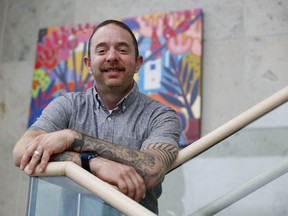Health
New Ottawa Hospital Program Empowers Young Cancer Patients

A new program at The Ottawa Hospital Cancer Centre is tackling the growing challenges faced by young cancer patients. Designed for adolescents and young adults aged 15 to 39, the program aims to provide resources and support to help them navigate the complexities of a cancer diagnosis. As the number of cancer cases among younger patients rises, this initiative seeks to ensure they feel less isolated during treatment.
Jay Abramovitch, who was diagnosed with Stage 3 colon cancer at 36, recalls feeling out of place during chemotherapy sessions. “You are sitting there and there can be dozens of other people around, and there is no one who looks like you,” he said. His experience is echoed by many young adults who often find themselves surrounded by older patients.
Alicia Hilderley, diagnosed with Stage 4 cervical cancer shortly after giving birth, shared her own struggles. “It can be incredibly lonely to be a young person with cancer when the whole system isn’t set up for you,” she remarked.
Addressing Unique Needs of Young Patients
The new adolescent and young adult (AYA) cancer program aims to go beyond traditional treatment. It offers support in essential areas such as education, career planning, relationships, and family life. Sarah Cleyn, an advanced practice nurse involved in the program, stated, “We know that adolescents and young adults have a unique set of needs that we don’t see elsewhere.”
The program is particularly relevant given the significant rise in cancer diagnoses among this age group. Over the last decade, the Champlain Region, which includes Ottawa and Eastern Ontario, has seen a 30 percent increase in AYA cancer cases. In the past year alone, the Regional Cancer Centre in Ottawa reported 500 new AYA cases.
Internationally, early-onset cancers are becoming more common, with colorectal and breast cancer particularly affecting younger individuals in Canada. Despite more than 80 percent of adolescents and young adults surviving their cancer, they often lack the necessary social and psychological support during and after treatment.
The program, which launched in June 2023, has already enrolled approximately 1,500 patients. Those diagnosed with cancer automatically join the program based on their age and receive support throughout their treatment and reintegration into daily life.
Empowerment Through Support
“The bulk of our work is empowerment,” Cleyn explained. The program aims to help young patients become equal partners in their care. It connects them with various resources to address issues ranging from financial concerns to family responsibilities.
Financial challenges are particularly acute for young patients who may be at the start of their careers. Cleyn noted, “There are financial implications to having a cancer diagnosis, whether we like it or not.” Abramovitch experienced this firsthand, as his diagnosis impacted his ability to work as a part-time firefighter and social services worker. He emphasized the importance of access to financial advice during such a critical time.
The support provided by the program is crucial for young patients like Abramovitch, who described having a dedicated support team as a “game-changer.” “Having that point person or a team for all the other stuff while the oncology team takes care of the disease is comforting,” he said. “It saves a lot of time and a lot of energy that you don’t have.”
The Ottawa program has been informed by successful models such as the AYA cancer program at Toronto’s University Health Network, which has been operational for the past decade. Cleyn highlighted that the Ottawa initiative is funded by a $150,000 grant from the Pediatric Oncology Group of Ontario, a relatively modest amount considering the patient load.
“There are a lot of gaps,” Cleyn remarked, referring to how the healthcare system tends to focus on older adults. “Those of us on the front lines have seen this increase in cancer in this age group and have really felt over time that it is important to address their unique needs.”
As the program continues to grow, it aims to create a comprehensive menu of resources and partnerships with organizations like financial institutions and fitness centers to further support young cancer patients. The initiative reflects a crucial step towards addressing the specific challenges faced by this vulnerable demographic and ensuring they do not have to face their cancer journey alone.
-

 Politics4 weeks ago
Politics4 weeks agoSecwepemc First Nation Seeks Aboriginal Title Over Kamloops Area
-

 World5 months ago
World5 months agoScientists Unearth Ancient Antarctic Ice to Unlock Climate Secrets
-

 Entertainment5 months ago
Entertainment5 months agoTrump and McCormick to Announce $70 Billion Energy Investments
-

 Science5 months ago
Science5 months agoFour Astronauts Return to Earth After International Space Station Mission
-

 Lifestyle5 months ago
Lifestyle5 months agoTransLink Launches Food Truck Program to Boost Revenue in Vancouver
-

 Technology3 months ago
Technology3 months agoApple Notes Enhances Functionality with Markdown Support in macOS 26
-

 Lifestyle3 months ago
Lifestyle3 months agoManitoba’s Burger Champion Shines Again Amid Dining Innovations
-

 Top Stories2 months ago
Top Stories2 months agoUrgent Update: Fatal Crash on Highway 99 Claims Life of Pitt Meadows Man
-

 Politics4 months ago
Politics4 months agoUkrainian Tennis Star Elina Svitolina Faces Death Threats Online
-

 Sports5 months ago
Sports5 months agoSearch Underway for Missing Hunter Amid Hokkaido Bear Emergency
-

 Politics5 months ago
Politics5 months agoCarney Engages First Nations Leaders at Development Law Summit
-

 Technology5 months ago
Technology5 months agoFrosthaven Launches Early Access on July 31, 2025









